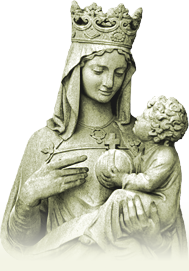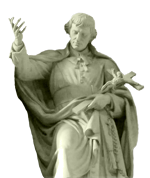Apologetics
About the Saints` intercession
PERGUNTA
Dear Gentlemen:
In the exercise of teaching, I am, sometimes, apostrophized and contested by protestants of the most diverse denominations. I end up discovering that, in synthesis, only two questions move away the simpler people from the Catholicism.
The first one is in regard to the intercession of the saints, because it remits to the Spiritism, and Idolatry - the cult to the images.
Second, is in regard to the primacy of Peter and the foundation of the Roman Catholic Apostolic Church. The argument, of Baptist origin, is widely known: Emperor Constantine would be the "legal founder" of the Church. The obvious intention is to justify the foundation of their own Church, retracing them to the so-called "Primitive Church" - also of apostolic origin - without hierarchies, dogmas. Only "praying communities" whose bedding is the Biblical phrase that says "where two or more will be congregated in my name..."
Usually I tend to refute idolatry accusations well, with Biblical recital, since they do not accept the Tradition. I tend to cite the resurrection of an assassinated trader, when in contact with the bones of Eli"sha. Also it is easy to prove biblically the intercession of the people - of the militant or glorious church. The intercession happens WITH CHRIST, FOR CHRIST and IN CHRIST, as it is inferred of the letters of Saint Paul.
It has been one week, approximately, since I debated with two neopentecostals, using the above mentioned arguments, aside from that Biblical passage: "Still today you will be with me in the Paradise". It was not enough, because they had refuted - telling me that the "today" of God is atemporal, since God also is. They had also cited me the parabola of the poor Lazarus and the rich Epulão: "It is impossible that one of us goes there to take care of you, o thirsty, as also it is impossible that one of you to come here, because there is an abyss between us". Therefore, even if Saint Dimas had gone to heaven, there was no way he could be in communication with us (even though we are not in the hell).
In summary, I would like to deserve from the gentlemen, the purpose to discover - preferably in the New Testament - arguments that prove that the saints ALREADY EFFECTIVELY ENJOY the GLORY OF CHRIST. In other words: That it will not be necessary to wait "in the limb" until the Final Judgment, to enjoy of the glorious vision. Nevertheless, I would like to have access to historical documents that prove the transmission of the papacy from Peter to Saint Linus, from this to Saint Anacletus, of this last one to Saint Clement I and thus to all the Popes "post-Constantine". If my request will be too laborious, I ask for an indication of other sources, since I am not a biblist nor an exegete.
Finally, a suggestion: Concentrate its apologetics effort in the points cited by me. I say this as humble suggestion only; extracted of my experience and not of the force of studies and academic headings, as I do not possess them.
In Jesus and Mary,
Eugênio Avelar Palm
RESPOSTA
Very Dear Professor Eugênio,
Hail Mary!
With pleasure I read, and I take action about the letter that you sent me. Reading it, I remembered my debates with Protestants, Communists and Atheists in my time of teaching.
May God always help you on your apostolate, so that it produces many fruit.
On the Saints intercession, I advise that you start proving that already in the Old Testament it very clearly happens, nevertheless, it is true. Why would it have changed on the New Testament?
To prove that the saints watch over and intercede for the living creatures, you had argued very well citing the case of the bones of Eli"sha that had revived one dead (II Kings, XIII, 21). Other passages could still be cited.
I remind you, before anything, that God called himself the God of Abraham, Isaac and Jacob, the God Of the LIVING CREATURES, when they were already dead.
"Remember Abraham, Isaac, and Israel, thy servants, to whom thou swarest by thine own self (.)" (Ex XXXII, 13).
In the book of Job it states that God said to the friends of Job who recriminated him unjustly:
" 8 Therefore take unto you now seven bullocks and seven rams, and go to my servant Job, and offer up for yourselves a burnt offering; and my servant Job shall pray for you: for him will I accept: lest I deal with you after your folly, in that ye have not spoken of me the thing which is right, like my servant Job." (Job, XLII, 8).
Therefore, God placed Job as an intermediate between Him and the friends of Job.
Another example is when Abraham interceded for Sodom, and God accepted his intercession (Gen. XVIII, 26-32).
Also Lot interceded for Zoar (Gen XIX, 21).And God Himself said to Abimelech:
" 7 Now therefore restore the man his wife; for he [Abraham] is a prophet, and he shall pray for thee, and thou shalt live: and if thou restore her not, know thou that thou shalt surely die, thou, and all that are thine." (Gen XX, 7).
Therefore, God announces that Abraham will be the intercessor for Abimelech and that God, nevertheless, will attend him.
And in the book of the Numbers if states that Moses interceded for the people and that God attended him:
" 1 And when the people complained, it displeased the LORD: and the LORD heard it; and his anger was kindled; and the fire of the LORD burnt among them, and consumed them that were in the uttermost parts of the camp. 2 And the people cried unto Moses; and when Moses prayed unto the LORD, the fire was quenched." (Num. XI, 1-2).
And when Israel fought, if Moses interceded for the people, God gave the victory to the weapons of Israel:
"11And it came to pass, when Moses held up his hand, that Israel prevailed: and when he let down his hand, Amalek prevailed" (Ex XVII, 11).
In the New Testament you are able to read that the two first miracles of Christ had been made upon friendly request of Our Lady, by intercession of the Virgin Mary.
The first miracle of Christ, in the grace order was the pardon of the original sin in John Baptist, before he was born.
When the Virgin Mary, soon after the incarnation of Christ, was to visit her cousin Saint Elisabeth, only upon hearing the voice of Mary that a miracle was made in John Baptist inside the womb of Isabel Saint:
"She 41And it came to pass, that, when Elisabeth heard the salutation of Mary, the babe leaped in her womb; and Elisabeth was filled with the Holy Ghost: 42And she spoke out with a loud voice, and said, Blessed art thou among women, and blessed is the fruit of thy womb. 43And whence is this to me, that the mother of my Lord should come to me? 44 For, lo, as soon as the voice of thy salutation sounded in mine ears, the babe leaped in my womb for joy ". (Luke. I, 41-44).
And the first miracle of Christ in the natural order was the transformation of the water in wine in Cana of the Galilee, miracle that He made upon request of the Virgin Mary (John. II, 1-10).
God makes thus because He wants that we mutually love each other by the love of God, and that we ask for and that we intercede for one another for favors that we have necessity.
And still, in the passage of the rich person and Lazarus, where the poor person goes to Abraham"s bosom, in heaven. The poor person, Lazarus, is not "sleeping" and awaiting for the day of the final Judgment, in the end of the world (Luke, XVI, 22-24), as you had remembered well.
And what these protestant contenders had argued on about the non communication is related to the impossibility to leave hell and the incommunicability of the convict souls with the living. And afterwards, it must be noticed that communication does not mean impossibility of intercession.
Therefore the souls of the Saints are not "sleeping", ignoring what happens, but, on the contrary, they are together with God, and with even more reason -- therefore they cannot sin anymore or disobey God in nothing absolutely -- they can intercede for their relatives, friends, for the Church, and also for the conversion of those who do not imagine or deny that this possible.
About the "today" that Christ said to the good thief, in fact, it means the eternity, the day that does not cease, the eternal today.
But, then, that "still today you will be with me in the paradise" meant that the good thief would, since then, go to heaven with Christ, enjoying the perpetual happiness, and not waiting for this happiness "sleeping" until the end of the times.
If Saint Paul constantly asked the faithful to pray for one another, and even for himself, since when one dies it passes to the eternal TODAY, -- that is not a zombie state, and yes "bosom of Abraham", heaven, it is clearly that this power to pray before God continues, and it is even more powerful, after death, or else we would have more power of intercede by prayers when living than whom were with God in heaven, at "Abraham bosom".
Therefore, the Church have always believed in the intercession of those "who had died in Christ," that is, sanctified.
That"s the reason for the cult to martyrs since the time of catacombs.
See, dear professor Eugênio, these registrations found in the tomb tablets, catacombs:
"Attic, sleep in peace safe of your salvation and ask solicit for our sins" (Registration in tablet, today in the Capitolino"s Museum)
"Vicência, ask in Christ for Febe and her husband" (Catacomb of St. Calixto).
"Sabácio, sweet soul, ASK and SUPPLICATE for YOUR BROTHERS and FRIENDS " (Catacomb of St.Gordiano).
"Genciano, faithful, in peace, that lived 21 years, 8 months and 16 days. THAT IN YOUR PRAYING YOU SUPPLICATE FOR US, BECAUSE WE KNOW YOU IN CHRIST " (Tablet found in via Salária).
And see, Professor, this other registration as it is shows the belief of the primitive Christians in the Purgatory:
"Oh Christ, have present the sinner Marcelino and Jovino, may they always live in God" (Cemetery of St. Peter)
[All these registrations are cited in the book of Navarrese Lúcio, Legitimate Interpretation of the Bible. p. 542]
As for Peter"s succession.
As your doubt is mostly towards the continuity of the Primacy, I give to you, as follows, some indications, taken from the excellent articles" collection of San Francisco de Sales, congregated and compiled under the title of Controversies. On the primacy of Peter granted by Christ himself, please refer to our small article "Peter"s Primacy":
"St. Peter was the Bishop of Rome, as it is proven by the old sources. Although he had been Bishop of Antioch before, the succession of this Holy See did not imply in pope succession, but in Episcopal succession only. And the reason is simple: St. Peter was still alive and in Rome when the succession in Antioch was given, and therefore it still conserved his Papal power, conditioning it to Rome and the successors of the capital of the Empire.
Therefore the succession must be given so that the Papal power continues guiding the Church. The Papal power is not personal, but it is exerted by those whom legitimately succeed St. Peter, who had received the power from Christ Himself.
As we said, then, Peter was in Rome, exerting his Papal power, when with his death it came the need of succession."
Thus refers to us St. Irenaeus (iii, 3 [A.D. 189]): "For the older, greater and the most famous Church, established for the two more glorious Apostles, Peter and Paul." and later " The blessed apostles [Peter and Paul], having founded and built up the church [of Rome] had handed to Linus the position to manage it as Bishop; to this it succeeded Anacletus; after it, in third place from the Apostles, Clement had received the episcopate."
And even let us quote Tertullian (Pr. Xxxii [A.D. 200]): "the Church also of the Romans publishes - that is, it demonstrates by public acts and proofs - that Clement was ordained by Peter." and in the same book (xxxvi): "Happy Church, in which the Apostles had shed its blood for its integral doctrine" - and stating of the Roman Church, "where the passion of Peter made itself as the passion of the Lord."
Eusebius (Chron. ann. 44 [A.D. 312]): "Peter, of Galilee nationality, the first Pontiff of the Christians, having initially established the Church of Antioch, drives to Rome, where, preaching the Gospel, he continues for twenty five years Bishop of the same city."
Epiphanius (II 27): "At Rome the first apostles and bishops were Peter and Paul, then Linus, then Cletus, then Clement, the contemporary of Peter and Paul" (Medicine Chest Against All Heresies 27:6 [A.D. 375]).
Dorotheus (in Syn.): "Linus was Bishop of Rome after his first guide, Peter."
Optatus of Milevio "You cannot deny that you are aware that in the city of Rome the Episcopal chair was given first to Peter; the chair in which Peter sat, the same who was head-that is why he is also called Cephas ["Rock"]-of all the apostles; the one chair in which unity is maintained by all" (The Schism of the Donatists 2:2 [A.D. 367]).
St. Hieronymite (ad Dam.): "With the successor of the fisherman and the disciple of the Cross I rejoice myself: I am joined in communion with Its Sanctity, in the chair of Peter."
St. Augustine (Ep. 53, ad. Gen.): "Peter was succeeded by Linus, Linus by Clement, Clement by Anacletus, Anacletus by Evaristus . . ." (Letters 53:1:2 [A.D. 412]).
The Catholic Encyclopedia also brings more historical references on the subject, and is worth to be consulted for deepening (http://www.newadvent.org/cathen/)
In Corde Jesu, semper,
Orlando Fedeli








